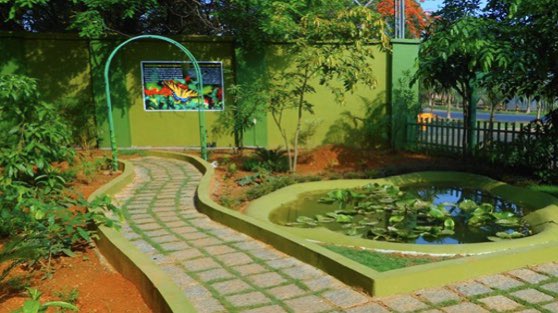India was on a slow yet steady trajectory towards sustainable development, with NITI Aayog acting as the planning and monitoring body. COVID-19 swept in uninvited and became the biggest obstacle to global and national development. It’s a case of two steps forward, one step back. Statistics already showed our lack of preparedness for Zero Hunger and Gender Equality. With the pandemic showing no signs of bowing out, we are no closer to achieving the SDGs by 2030. However, public sector enterprises can play a significant role in recharging social progress in the subcontinent. BPCL CSR projects have been doggedly collaborating with various government ministries, nonprofit organisations and other implementing agencies to achieve sustainable development.
For example, under the government’s ‘Pradhan Mantri Ujjwala Yojana’ (PMUY), the Bharat Petroleum corporate social responsibility division enrolled 90 lakh new LPG consumers in the last financial year. This brings the sum total of LPG connections under the PMUY scheme to a whopping 2 crores! The company’s employees contributed Rs. 4.27 crores from their own salary in the fight against COVID-19.
The energy sector leader prides itself in having responsible corporate citizenry. Its commitment to corporate social responsibility (CSR) and Nation Building is a no-brainer. For example, BPCL CSR recently put India on the international map again, with the World’s First Seven-Coach Hospital Train.
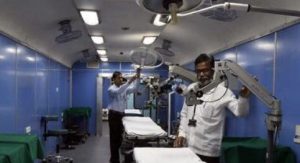
The hospital-on-a-train called “Lifeline Express” has operation theatres fitted with equipment. It dispenses free healthcare and is especially sensitive to the needs of Persons With Disabilities (PwD). It’s a combined initiative, in association with Impact India Foundation, Lifeline Express and would have been impossible without the active support of the Indian Railway officials. With 765 free surgeries including cataract surgeries and procedures for PwDs with cleft lips, this is no ordinary medical unit. It serves the whole spectrum of PwDs, from polio patients, cataract patients, the visually challenged, hearing impaired and epilepsy patients. Moreover, gynaecological and dental procedures are also done on the seven-coach train.
1. About BPCL
Bharat Petroleum Corporation Limited (BPCL) is a PSU that was awarded Maharatna status. Its origin goes a century-and-a-half back to 1860 when it was known as Burma Oil Company. India gained independence, and a few years later, the energised new government of India took over the reins in 1952. However, the company had a different name then too – Bharat Refineries Ltd. It wasn’t until 1977 that it became Bharat Petroleum Corporation Ltd., the pioneering energy conglomerate. Refinery, Retail, LPG and Lubricants are the main business of the company. It has seven business units and is headquartered in Mumbai, Maharashtra.
The company ranked No. 275 in the Fortune Global 500 list 2019. Another feather in its cap is that the fully integrated and upgraded Kochi Refinery has the distinction of being the largest PSU Refinery in India.
2. BPCL CSR
BPCL Corporate Social Responsibility (CSR) operates in the core thrust areas of Education, Skill Development, Persons with Disabilities, Water Conservation, Health and Hygiene. Respectful, synergetic partnerships (SDG 17) are key to carrying out the projects for the upliftment of the most marginalised sections in the regions it operates.
2.1. Leader speak
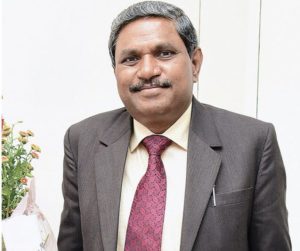
Rajkumar, Chairman and Managing Director, BPCL is happy with the results. He says:
“We are working towards enhancing the capabilities of the youth by jointly managing Skill Development Institutes (SDIs) along with oil industry members at Visakhapatnam, Bhubaneswar, Ahmedabad, Guwahati and Rae Bareli. We have taken the lead in developing the SDI in Kochi and have worked towards placement/ employment-linked skilling of women, unemployed youth and the disabled. With these initiatives, we support the promotion of higher education and employability skills to strengthen the ‘Skill India’ initiatives of the Government of India.”
2.2 CSR Spend
A look at the spends on community development projects in the last 5 years shows that BPCL has not met the prescribed amount. While central public sector enterprises like NTPC and Indian Oil have either met or exceeded the budget, Bharat Petroleum is among the PSUs to default on complying with the prescribed annual spend in relation to the annual profits.
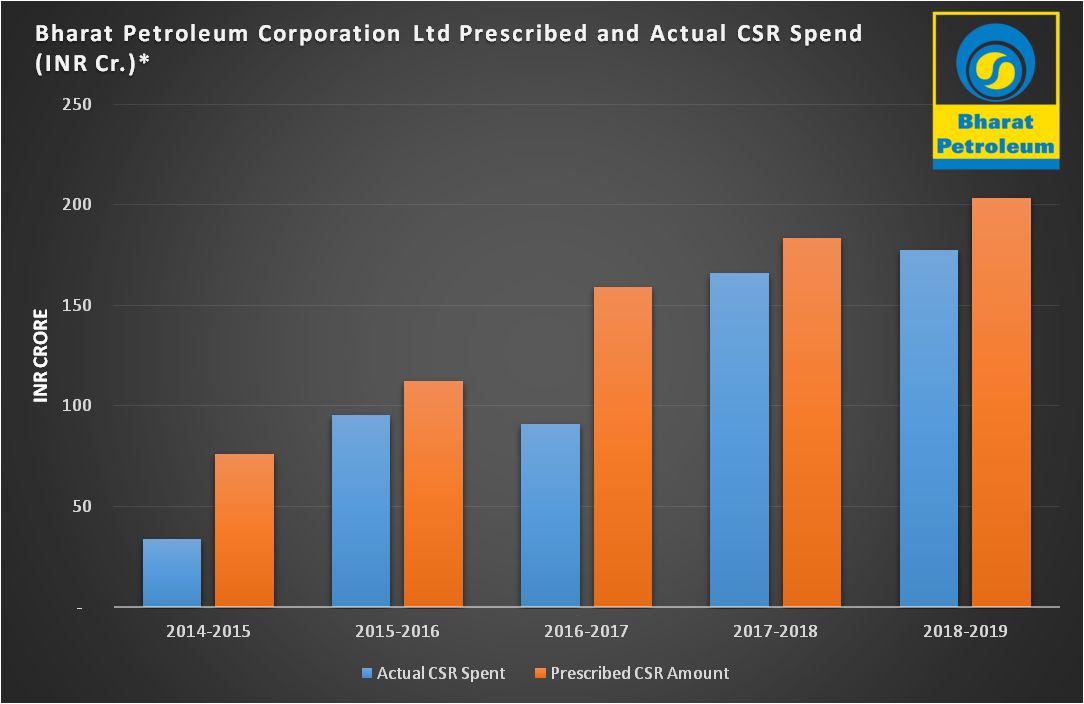
2.3. CSR philosophy
Corporate Social Responsibility is an inimitable part of the company’s business beliefs. You can’t be a profitable entity, without considering the People and Planet; essentially the 3 P’s of the popular “triple bottom line” that top global conglomerates swear by in creating CSR strategy.
Strategic alignment is essential to fulfilling the national and Sustainable Development Goals (SDGs) at any organisation, more so at one as large as Bharat Petroleum. This strategy was crystallized from decades of work in the social sector, long before the mandate came into effect with the Companies Act, 2013.
2.3. The story so far
CSR at BPCL started back in the 80s when few corporate houses knew what the term implied. Mahul village near the refinery in Mumbai was the starting point. The first CSR programme set out to benefit the fishermen and fisherwomen, their health and literacy levels. The Mahul project took off.
High on the success seen in Mahul, the team planned and initiated another community development project in Karjat. Adopting Karjat led to the top brass at BPCL realising the significance of the impact that CSR interventions could make to people’s lives, and so started this PSU’s journey of doing good. The firm went on to adopt many other villages and take over rural development in those locations.
The company undertakes community development initiatives across 100% of the locations where it has operations and refineries. Other areas in dire need of infrastructure and disaster relief also benefit.
2.4. CSR Department
There is a dedicated CSR Department that monitors the progress of all the interventions. The CSR Committee formed by the Board regularly supervises the plans, funding and transparency in hiring partners, implementation and impact. In fact, impact assessment is done by third parties to ensure complete impartiality in reporting the results of all the interventions.
Any kind of operations will have negative as well as positive effects on the people living there. The CSR Department regularly does an assessment of the impact on the communities living in the villages surrounding the factories, refineries and offices. The report is taken back to the CSR Committee for redressing any grievances.
3. Education
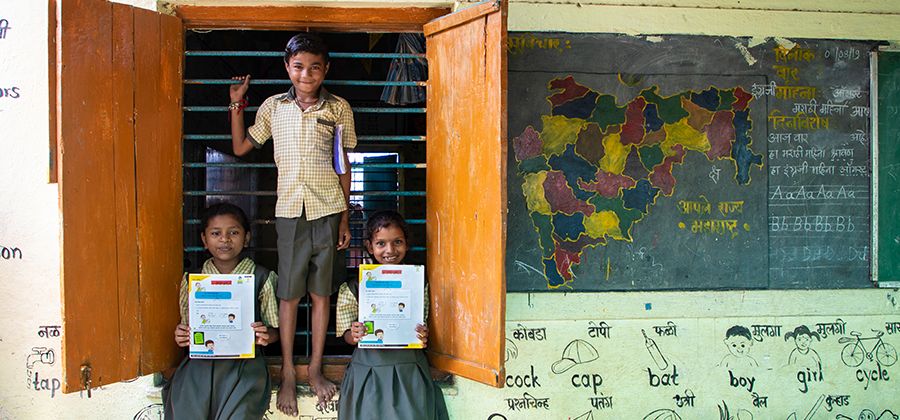
CSR of BPCL believes education is a basic right of children and a tool of empowering them for India’s future. The nation is nothing without its children’s growth and prosperity, both of which are impossible without quality education. This is the reason quality education is a core thrust area. The CSR Department monitors successful programmes across units and scales them to be replicated on a larger canvas. In this manner, it has been successful in educating 8 lakh students through its programmes. There are two flagship education programmes in progress: CAL and Saksham.
3.1. Computer Assisted Learning (CAL)
CAL is a flagship CSR project of BPCL for digital literacy of deserving school students. CAL has made 1 lakh kids literate in Uran, Lucknow, Mumbai and Jaipur since it was launched. Digital literacy has become all the more crucial in the wake of COVID-19 and the lockdown induced by the pandemic. It has come to the point where children who aren’t computer-savvy might not be able to continue their education as smoothly as intended before coronavirus.
Another aspect of CAL is that it has managed to reduce dropout rates in government school kids, who are otherwise easily distracted with the pen-and-paper mode of learning. Computer education has added another dimension to their learning. Girls are especially empowered since they aren’t always allowed access to Personal Computers at home; gadgets are reserved for the male members in many families.
3.2. Project Saksham
Saksham is another flagship project that works towards empowering school principals and teachers, who do the thankless job of educating rambunctious children, day after day. Government school teachers are especially in need of help since they do not get the benefit of upgrading their skill and knowledge base regularly.
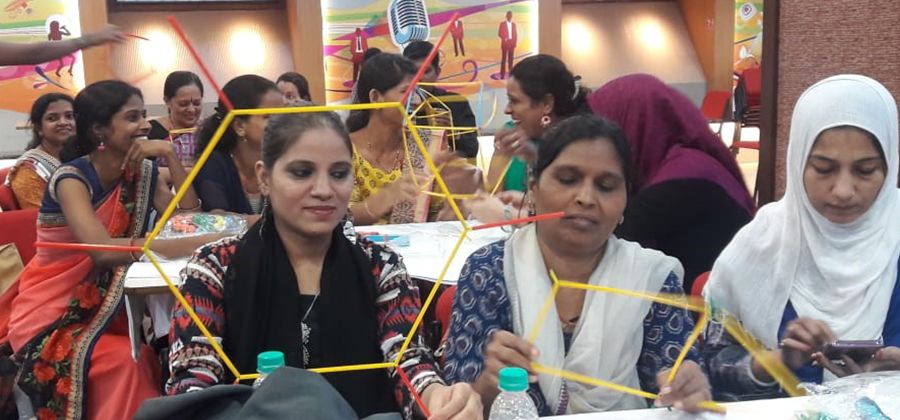
Saksham ran from 2012 to 2019 in partnership with Pratham Infotech Foundation. The idea was to bring an intrinsic change in the entire school through leadership training of teachers, who are frankly overwhelmed in most cases. Special educators are roped in to teach them new math, science, humanities, languages and the importance of sports. Saksham has created more than 700 leader-teachers in 305 government recognised private and municipal schools. Last year, Saksham trained 162 teachers and school principals in Mumbai.
4. Skill Development
BPCL CSR has made the government’s ‘Skill India’ programme a priority. It is setting up more Skill Development Institutes (SDI) than ever before, in order to empower the youth and disenfranchised towards Atmanirbhar Bharat.
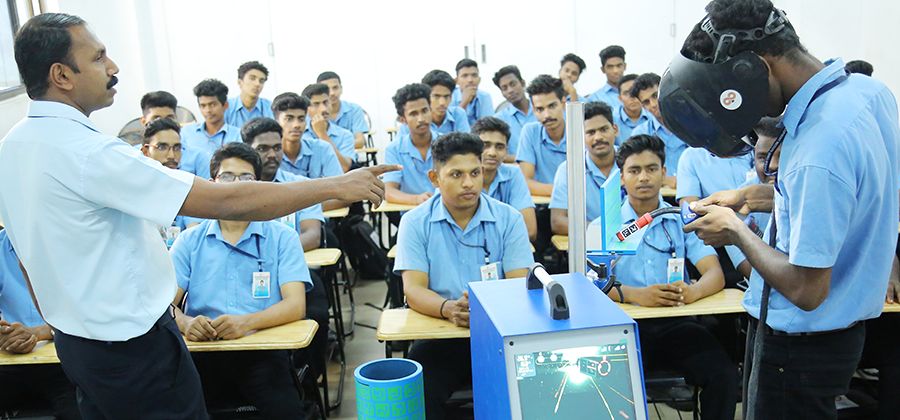
The courses in the Kochi SDI are aligned to the centre’s National Skills Qualification Framework (NSQF) with affiliation to various Sector Skill Councils and NSDC. Last year alone, SDI at Kochi trained 312 youth. There is a proposal to set up a second SDI campus in Kerala where 1,000 new students will get training every year.
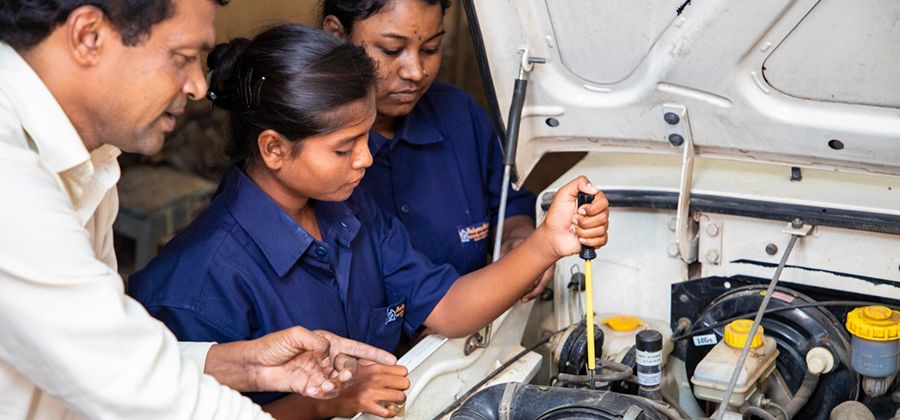
The various SDI upskills and reskills people from aspirational districts with a focus on unemployed youth, PwDs and women. Young people with leprosy are made employment-ready; 792 such youth were trained in technical skills last year. The visually impaired are trained in acupressure and massage at the SDI in Latur.
5. Water Conservation
Lack of water leads to various societal ills, including dehydration, water-borne diseases, improper sanitation and hygiene. A sustainable economy is impossible without access to water. Water is of paramount importance for survival itself. Keeping these universal truths in mind, Bharat Petroleum CSR has made rigorous attempts to improve water security in rural areas.
5.1. Project BOOND
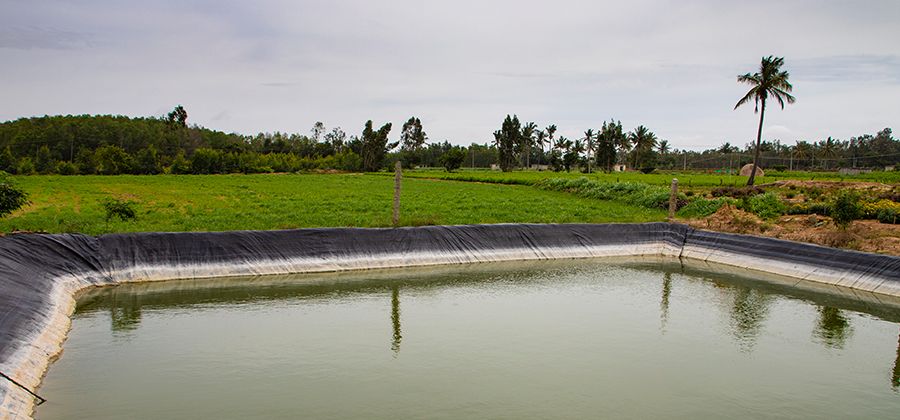
BPCL initiated Project BOOND in 2010 to turn water-scarce villages into water-positive places. In the last 10 years, BOOND has made 280 villages water-positive through rainwater harvesting, drip irrigation, and water retention measures that preserved this precious natural resource. So effective was the programme that it won international acclaim – Asian CSR Award and the SKOCH Silver Award.
Bharat Petroleum’s team travelled to Tamil Nadu, Andhra Pradesh and Karnataka for a thorough assessment of the situation. They found that the rural populace depended on quaint little ponds and bore wells for hydration, yet was perennially deprived of aqua. The ponds would dry up when it rained lower than usual. Bore wells didn’t get the attention they require for their upkeep.
Bharat Petroleum CSR worked together with NGO partner DHAN (Development of Humane Action) to restore and maintain water structures so that villages can have uninterrupted supply through the year for. One component of BOOND is Project BOOND AkshayJal II (2013-2016) which had on its agenda rainwater harvesting structures and sustainable livelihood for the villagers. The end result of the drip irrigation component was higher crop yield and more availability of water for farmers in Mokhada (Maharashtra).
BPCL CSR also implemented Project BOOND Neer in Bharatpur (Rajasthan) that was marred by a long record of floods and droughts. BOOND Neer’s interventions was able to retain water in the wells and moisture in the soil. Wheat and mustard farmers benefitted the most there.
Apart from watershed development and rainwater harvesting, this flagship project has been attuning farmers in Bharatpur to organic agricultural practices, dividing them into groups for training sessions and forming SHGs for the women since 2013. With the intention of lending a sense of ownership to the villagers, BOOND motivates them to share 15%-25% of their expenses.
The project proactively formed various committees for the financial and organizational goings-on of the activities so that the villagers go from being mere beneficiaries to stakeholders who can continue on their own. Over time, the CSR team has moved out of the sites after ensuring that the participants are self-reliant. Project BOOND has inadvertently become a CSR programme that drives Atmanirbhar Bharat Abhiyan.
6. Healthcare
BPCL CSR activities in healthcare are aligned to SDG 3: Good health and well being through its value-driven healthcare initiatives. Free medical care and treatment, improving the existing healthcare infrastructure and reaching out to cancer patients and PwDs in need form the main components of CSR in health here.
Of special note in the healthcare initiatives affordable cancer care in Darrang, situated in Assam. It is designed to offer everything from early detection and cancer screening to treatment with palliative care.
7. Sanitation
Since the PSU’s goals are aligned with the Indian government’s missions, Clean India is naturally part of the corporate social responsibility framework here. Not only the community development team, but many employees also participate in Swachhata Pakhwada across the refineries. The company is also driving various initiatives for sanitation and hygiene.
7.1. Bandicoot robotic scavenger
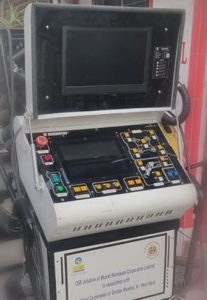
The practice of manual scavenging is one of the most degrading and unsafe for human beings. Although it has been officially banned in our country, sanitation workers are still employed to go down into drains and gutters and clean them with their own two hands. To eliminate the practice, BPCL works with local municipal corporations for the procurement of a robotic manhole cleaner called Bandicoot. Apart from this technological alternative to manual scavenging, BPCL CSR also does capacity-building of sanitation workers so they can operate Bandicoot themselves and also lead a healthier life.
7.2. Solid Waste Management
Another award-winning programme is the sustainable solid waste management model, which bagged the Golden Peacock Award for CSR in January 2019. The company has tied up with the local corporation. The SLM wing has formed 33 micro-composting units which not only recycle waste but also generate a subsidiary income for the sanitation workers. They first segregate waste at the source into dry, wet and other categories. This reduces the burden on landfills. The dry waste is sent for recycling and the wet kitchen waste is set aside for composting. The workers sell the “black gold” i.e. compost and make a few extra bucks too!
7.3. Sanitation Units
The company has built 4,300 sanitation units for schools to villages, houses to small communities in line with Swachh Bharat Abhiyan and IEC. The latter is a campaign encompassing “Information, Education and Communication” to prevent the ignoble ODC (open defecation). In keeping with its attention to PwD, they conducted special toilets for the physically challenged.
8. Rural Development
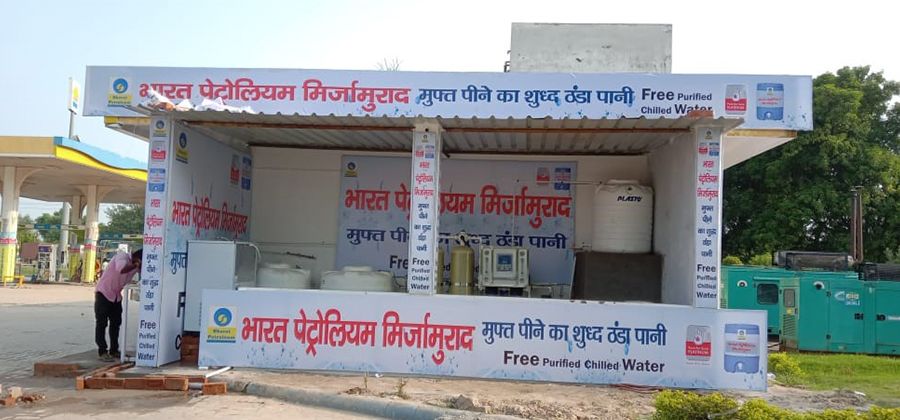
BPCL CSR initiatives are behind the major rural development and infrastructure in districts like Gadchiroli in Maharashtra. These undertakings essentially are meant to empower the people at an individual, family, village and community level. A needs assessment survey at the beginning establishes the unique needs of every rural area.
From providing clean drinking water for free, establishing new modes of livelihood for residents, setting up libraries where children and grown-ups can read at leisure, to central kitchens where food is available for all, the activities are integrated to benefit each place in a sustainable manner.
9. Environment
Environmental initiatives are meant to mitigate the impact of the company’s operations. Apart from mass tree plantation and green awareness, the other ecological standouts are the butterfly gardens and road made out of plastic waste.
9.1. Butterfly Parks
